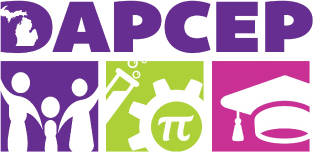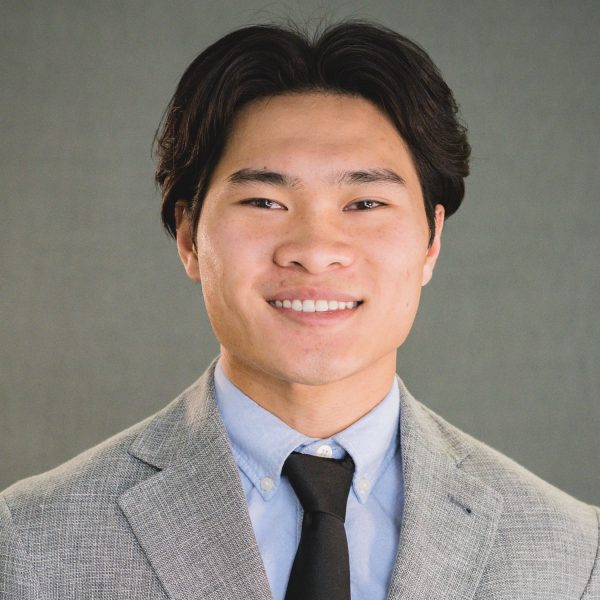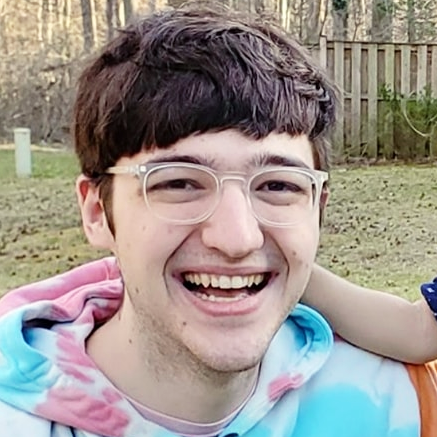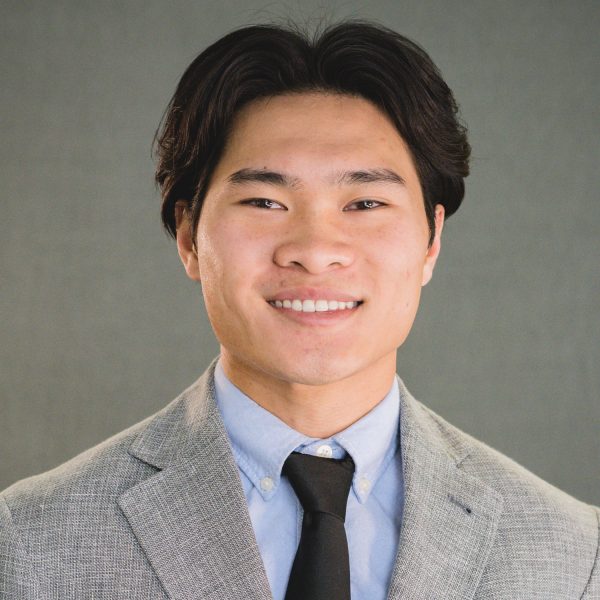
This spring, Computer Science Ph.D. student Kirk Thelen, Software Engineering undergraduate Carson Perkins, and Associate Professor Charles Wallace co-led an “Introduction to Computer Science” course for a cohort of Detroit area 11th graders.
Read Q&As with Kirk Thelen and Carson Perkins below.
Part of the Detroit Area Pre-College Engineering Program (DAPCEP) “Ford Future” initiative, the six-week Saturday course was presented this March and April. Funding for the administration of the DAPCEP course was made possible by a grant from DAPCEP. Wallace, also Associate Dean for Curriculum and Instruction for the College of Computing, was the grant’s principal investigator.
Wallace says the DAPCEP course awakened the high school students to the beauty and joy of computing, explaining that the Michigan Tech course gave students lots of room for creativity and opportunities to play and experiment.
But more than that, “We encouraged students to step away from their comfort zones to try new things, and also to make mistakes, because that’s how you learn,” says Wallace.
“Teaching with Copper Country Coders and DAPCEP allows me to practice explaining concepts that are familiar to me, but in a language that’s digestible for those without my background,” says Thelen, who also instructed the DAPCEP course in spring 2022.
Thelen and Perkins have also instructed young students in Copper Country Coders, a student organization in which Michigan Tech students teach computing classes to local middle and high school students.
“The best thing about teaching is interacting with students who want to go above and beyond,” says Thelen. “Finding those passionate students really helps to foster great mentor-mentee relationships where you can pass on some of your own knowledge.”
Perkins says that the DAPCEP and CC Coders teaching experiences have enriched his education by building his foundational computer science knowledge and improving his public speaking and communications skills.
For Perkins, the most rewarding part of the class was helping answer student questions. “It really showed their interest in what we were doing and how the students thought through the different programming challenges,” he says. “The high school students picked up on the programming topics extremely quickly. They always had insightful questions, which gave me a happy surprise.”
Since 2021, hundreds of DAPCEP high school students have participated in “Ford Future,” a multi-term cohort model program funded by Ford Motor Company, says DAPCEP program manager Sakina Masud.
Masud explains that the “Ford Future” program, for 11th and 12th graders,gives students many opportunities, including the completion of a series of STEM academic courses, residential summer camps, and experiential activities in partnership with corporate partners and universities. The program culminates with an opportunity to fill a summer internship slot at Ford Motor Company.
“Michigan Tech has had a longstanding partnership with DAPCEP, which shares in our mission of expanding access to early educational and career exploration opportunities for youth,” says Cassy Tefft de Muñoz, executive director for enrollment initiatives in Michigan Tech’s Center for Educational Outreach. “This program is a great example of how we are working together and leveraging technology to deliver high-quality learning in a virtual setting.”
Michigan Tech also collaborates with DAPCEP to provide Detroit-area middle and high school students with opportunities to attend Summer Youth Programs (SYP). Since 1972, SYP has offered students in grades 6-11 weeklong, hands-on explorations focused on the needs of tomorrow.
“SYP is like summer camp, but smarter—these high-impact educational experiences provide an opportunity for students to experience college in a fun, engaging, and safe environment. Registration is still open for summer 2023 SYP programs,” says Tefft de Muñoz.
Each spring, a new cohort of 40 students begins the “Ford Future” program by participating in a series of six-week Saturday classes in the fall and spring; summer camps; a trip to a national STEM conference; college preparatory courses; soft-skills training and development; and ultimately the process of applying for a summer internship, says Masud.
Masud says that the program’s academic courses focus on STEM topics including computer science, electrical engineering, and mechanical engineering. And to give students a more robust experience, the Saturday courses are designed and facilitated on college campuses (or virtually) in partnership with leading universities in the state of Michigan, including Michigan Technological University, Michigan State University, and the University of Michigan Ann Arbor.
To date, thirty students have completed internships at Ford Motor Company, putting the skills learned in the classroom into action in the real world, says Masud.
DAPCEP’s mission is to increase the number of historically underrepresented students who are motivated and academically prepared to pursue degrees leading to STEM careers, according to the organization’s website. The organization achieves this with supplemental academic programs for Pre-K to 12th-grade students by partnering with schools and universities to develop and facilitate engaging curricula. DAPCEP is driven to increase the number of students who graduate from high school and pursue degrees and/or careers in STEM fields; the program serves 11,000 students annually.

Q and A with Carson Perkins, Software Engineering Undergraduate
What did you learn from teaching the DAPCEP Class?
I learned how to create lesson plans and communicate better with the class in order to help them better understand the coding principles we were teaching.
What was most rewarding about teaching the DAPCEP class?
The most rewarding part of the class was helping answer student questions. It really showed their interest in what we were doing and how the students thought through the different programming challenges.
How did the experience enrich your education?
This experience enriched my education by making sure I had a strong foundation by understanding and answering questions that the students were asking me. Leading the classes also improved my public speaking and communications skills.
With the experience help you in your career?
Yes, this experience greatly improved my communication skills, which will be invaluable in my future career.
How did teaching for Copper Country Coders help you in the DAPCEP course?
My experiences with CCCoders directly prepared me to teach in the DAPCEP course since I lead my own class in Coders DAPCEP was more teaching just different since it was virtual.
Is there a particular memory of the course you’d like to share?
I was surprised at the amount of student interest in coding. Following some classes, students would ask questions pertaining to the real-world uses of programming and what they could do next, which was fun to talk about.
Did the high school students surprise you? How so?
The high school students picked up on the programming topics extremely fast. They always had insightful questions, which gave me a happy surprise.

Q and A with Kirk Thelen, Ph.D. in Computer Science Student
What did you learn from teaching the DAPCEP class?
Every opportunity to teach someone else is an opportunity to learn something yourself! Before I came to Tech, I was a Learning Assistant at Lansing Community College for an Introduction to Python course. At Tech, I’ve been with Copper Country Coders since 2020 and this was my second year teaching DAPCEP. I still manage to learn new strategies, new ways to approach problems, and new methods for engaging students each time that I teach. I think the most important thing that I’ve learned is to never underestimate your students–they can and will surprise you with how they approach the problems that you give them. Sometimes they even come up with better solutions than mine!
What did you find most rewarding about the class?
Teaching DAPCEP is rewarding in several different ways, but the best experience is when you find the students that really obviously want to be there. While I’d love to believe that every single student we have is just as passionate about computer science as I am, every year we always have a couple of students that really go above and beyond. Finding those passionate students really helps to foster a great mentor-mentee relationship where you can pass on some of your own knowledge. Even though I’m still a student myself, I’ve gotten to talk about some of my favorite computing concepts and even about what “university student life” is like. It’s really rewarding to feel like you’re positively impacting the lives of potential computer science students and encouraging them to take a shot at this competitive and challenging field of study.
How did the experience enrich your education?
I’m always trying to learn about computer science, but anyone who knows me personally knows that I also love to talk about what I’ve already learned. They might also tell you that my explanations aren’t always perfect or easy to follow! Teaching with Coders and DAPCEP lets me practice my ability to explain concepts that are familiar to me in a language that’s digestible for people without my background. Just because you know some information doesn’t mean that you’re very good at teaching it, but being able to translate your thoughts and ideas into language that your audience understands is an essential skill for any scientist or researcher. DAPCEP gives me opportunities to hone that skill.
Do you feel that the experience will also help you in the workplace/in your career?
I definitely think that this experience will help me throughout my career in much the same way that it is helping me with my education. Regardless of where you end up, the ability to communicate your ideas clearly is always an in-demand skill that teaching helps you master.
How did your experience teaching for Copper Country Coders help you in the DAPCEP course?
In this course, we teach Snap! which is a block-based programming language created at the University of California, Berkeley. In Coders, I assisted in teaching Snap! for two years, which helped greatly in preparing material for teaching my first 2022 DAPCEP course in 2022. That’s not to say that it has been as simple as teaching the Coders material. In the DAPCEP program the students are older and we have less time to teach them. We’ve had to modify the material that we used in Coders significantly, and even from when we first taught the course to the 2023 version we’ve made changes. Coders gave me a great amount of background knowledge on Snap! and teaching it to students with limited background knowledge, but I’ve learned a lot from DAPCEP too that I couldn’t learn just from Coders.
Is there a particular memory of the course you’d like to share?
The memory that comes to my mind from our 2023 class is when a student came up with a better solution to a problem than I had–and I wrote the problem! The beauty of Snap! is that there are a lot of premade “blocks” of code that you can use to create your solutions, but my programming background in typed languages often causes me to think of creating solutions myself. In this specific scenario, I had designed a problem with the intention of students creating the solution themselves, but one student pointed out that a premade block would completely solve the problem for us! I was shocked because I had never even noticed this block before, but I also never even thought to look for it. I think it goes to show not only that you really shouldn’t underestimate these students, but also that there can be a lot of different solutions to the same problem.
Did the high school students surprise you? How so?
A lot of people have preconceived ideas about high school students, and those ideas will only hold you back when you actually get to work with them. These students were incredibly smart, kind, and interested in the material that we were teaching them I was surprised by how well they handled all the material we threw at them in only six classes. And I was also pleased and surprised at how appreciative the DAPCEP students were.
What did you learn from teaching the DAPCEP class?
Every opportunity to teach someone else is an opportunity to learn something yourself! Before I came to Tech, I was a Learning Assistant at Lansing Community College for an Introduction to Python course. At Tech, I’ve been with Copper Country Coders since 2020 and this was my second year teaching DAPCEP. I still manage to learn new strategies, new ways to approach problems, and new methods for engaging students each time that I teach. I think the most important thing that I’ve learned is to never underestimate your students–they can and will surprise you with how they approach the problems that you give them. Sometimes they even come up with better solutions than mine!
What did you find most rewarding about the class?
Teaching DAPCEP is rewarding in several different ways, but the best experience is when you find the students that really obviously want to be there. While I’d love to believe that every single student we have is just as passionate about computer science as I am, every year we always have a couple of students that really go above and beyond. Finding those passionate students really helps to foster a great mentor-mentee relationship where you can pass on some of your own knowledge. Even though I’m still a student myself, I’ve gotten to talk about some of my favorite computing concepts and even about what “university student life” is like. It’s really rewarding to feel like you’re positively impacting the lives of potential computer science students and encouraging them to take a shot at this competitive and challenging field of study.
How did the experience enrich your education?
I’m always trying to learn about computer science, but anyone who knows me personally knows that I also love to talk about what I’ve already learned. They might also tell you that my explanations aren’t always perfect or easy to follow! Teaching with Coders and DAPCEP lets me practice my ability to explain concepts that are familiar to me in a language that’s digestible for people without my background. Just because you know some information doesn’t mean that you’re very good at teaching it, but being able to translate your thoughts and ideas into language that your audience understands is an essential skill for any scientist or researcher. DAPCEP gives me opportunities to hone that skill.
Do you feel that the experience will also help you in the workplace/in your career?
I definitely think that this experience will help me throughout my career in much the same way that it is helping me with my education. Regardless of where you end up, the ability to communicate your ideas clearly is always an in-demand skill that teaching helps you master.
How did your experience teaching for Copper Country Coders help you in the DAPCEP course?
In this course, we teach Snap! which is a block-based programming language created at the University of California, Berkeley. In Coders, I assisted in teaching Snap! for two years, which helped greatly in preparing material for teaching my first 2022 DAPCEP course in 2022. That’s not to say that it has been as simple as teaching the Coders material. In the DAPCEP program the students are older and we have less time to teach them. We’ve had to modify the material that we used in Coders significantly, and even from when we first taught the course to the 2023 version we’ve made changes. Coders gave me a great amount of background knowledge on Snap! and teaching it to students with limited background knowledge, but I’ve learned a lot from DAPCEP too that I couldn’t learn just from Coders.
Is there a particular memory of the course you’d like to share?
The memory that comes to my mind from our 2023 class is when a student came up with a better solution to a problem than I had–and I wrote the problem! The beauty of Snap! is that there are a lot of premade “blocks” of code that you can use to create your solutions, but my programming background in typed languages often causes me to think of creating solutions myself. In this specific scenario, I had designed a problem with the intention of students creating the solution themselves, but one student pointed out that a premade block would completely solve the problem for us! I was shocked because I had never even noticed this block before, but I also never even thought to look for it. I think it goes to show not only that you really shouldn’t underestimate these students, but also that there can be a lot of different solutions to the same problem.
Did the high school students surprise you? How so?
A lot of people have preconceived ideas about high school students, and those ideas will only hold you back when you actually get to work with them. These students were incredibly smart, kind, and interested in the material that we were teaching them I was surprised by how well they handled all the material we threw at them in only six classes. And I was also pleased and surprised at how appreciative the DAPCEP students were.
